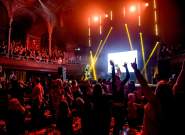Dr Sorcha Ní Fhlainn on a 1980s Gothic Revival, interviewed by Daisy Brocklehurst.
The return of Stranger Things after a three-year hiatus has enveloped the world. Kate Bush is back in the charts, Top Gun is in cinemas, and the rise of the mullet is undeniable. Welcome back to the 80s.
It can be easy to look back on a certain period in time with rose tinted glasses and ignore the issues that were faced in the world, focusing instead on music, film, and fashion but Dr Sorcha Ní Fhlainn, senior lecturer in Film Studies and American Studies at Manchester Metropolitan University, is exploring the 1980s gothic genre and its popular revival today. You only need to glance at Sorcha’s twitter feed to see a true fan of the 80s. Stranger Things clips are interspersed with reviews of the Back To The Future stage show, recently performed in Manchester. Sorcha wrote her first Back To The Future publication in 2010 titled The Worlds Of Back To The Future: Critical Essays On The Films and is currently working on a book on the director, Robert Zemeckis, and screen collaborator Bob Gale which is due for publication in 2025. I sat down with Sorcha, who is also film critic for BBC Radio Manchester, to talk all things 80s and why this project is so important to her and her work (avoiding any Stranger Things spoilers along the way).

We’ve seen a resurgence of 80s pop culture in the past few years with the help of Stranger Things and the reprisal of cult horror films like Halloween. Do you think this is here to stay?
“We’ve had these revivals before. There was a huge revival at the end of the 90s of the 70s. Everyone was wearing flares. Everyone was listening to the Bee Gees. The Bee Gees got cool again. There are these revivals in time. In the 80s people were obsessed with the 50s, we tend to look back on the time’s that immediately preceded us. We’ve been living in the long 1980s for about twenty years. When Stranger Things finishes, we will see the idealisation of the 80s recede. We’ve had this ability to archive and record the 80s which has meant it is more accessible. If we didn’t have those means we would not be going back like we have done. I think that there’s so many parallels between what’s going on now and the late 70s/ early 80s in a global sense. There’s a sense of real worry about the future. It’s a different kind of narrative but its got a contemporary spin on it. I’m hoping that we end up in somewhere where it all just feels a bit better.”
Why did you choose to focus on 1980s gothic for your latest project?
“I started working on this 80s project, in my head anyway, about thirteen years ago. I’ve always been fascinated by that period in time because I think it’s so rich in terms of the texts that come out of it, it’s also rich in terms of the technology that came out of it and the advancement of technology like VHS recorders and that sort of thing. The 80s is very formative to your taste no matter where you grow up. In terms of the gothic and horror texts of the 1980s, I am absolutely fascinated because so many things happened at once such as graphic horror, body horror, and the idea of the villain as the anti-hero of the piece. You see this with Freddy Kruger, Jason Vorhees, and Pinhead from Hellraiser, characters who have gained a cult traction. There was also an explosion of TV conventions in the 80s. But the 80s if you were an adult, was a horrible time. In Ireland we had no money, we were broke in the 80s, it was an awful black hole of experience but as a kid it was amazing because of television and popular culture material. These disjoints have informed how we look back on the 80s. There are kids now that are watching stuff their parents watched and it speaks to them too.”

Do you think that the generation that didn’t grow up in the 80s has idealised that time?
“We look back on the 80s not necessarily as a time we want to live through, but we can cultivate that emotional response that we had as kids because we were watching really good stuff, stuff that was made for us. Why I think something like Stranger Things works really well is that the 80s that it deploys, yes it has the soundtrack and the Rubix cubes, bright colours, big hair (that’s all surface but none the less really good fun) but that is not necessarily nostalgia in the restorative sense that we want to go back. I think it is more reflective nostalgia which is the idea that we are looking back at that period as it has informed us here and now. We’re thinking about how the past has brought us to this point so it’s a comment on the present. I think that show [Stranger Things] speaks to two very different audiences, it speaks to people like me who remember the 80s, we still love 80s music, I still watch a lot of 80s films, some of it is really ropey but I still love it because I have such strong memories of it from childhood. And then there’s the other crowd who are the kids who will never have a memory of the 80s, but they love the fact that there is this band of young kids who are going to save the world each and every season. Adults are always secondary in shows like Stranger Things and Fear Street.”
We both agree that the rise in 1980s gothic and the resurgence in pop culture has been great escapism during a restless time, that at the end of the day it might seem bleak but, hey, at least we’re not in the upside down.
“At a time that feels very dark there’s always a bright little spark.”
Dr Sorcha Ní Fhlainn’s upcoming publications include a special edition of Gothic Studies, all on the gothic 1980s, featuring an article on Stranger Things.
Sorcha’s co-edited collection Twentieth-Century Gothic is out now, including her chapter on cinema from the 1980s to 2000.







